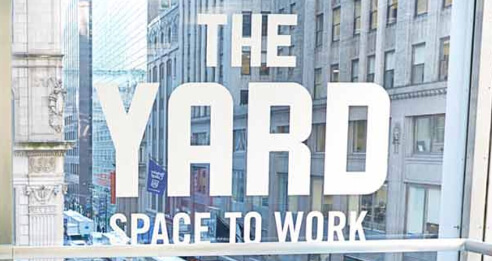
Largest Coworking Companies


Coworking chains are enticing for potential members in many ways. They have multiple locations in most major cities, which means wherever you are, there will most likely be one close to your home or even your Airbnb when you're traveling. Plus they often have flexible membership options that grant access to multiple locations, especially for members of larger coworking companies. This is a huge benefit to users that travel frequently — whether it's for work, to meet clients, or simply for pleasure.
Current and future coworking space owners should keep an eye on these companies because they have unique features and — at the moment — are extremely successful. These companies are experiencing tremendous growth by utilizing various business models, from franchising to more boutique, customized services. In the years to come, the impact these companies have on the industry, from the trends they introduce to the profits gained, will determine the future of coworking.
Interested in coworking statistics? Check out our in-depth analysis of the coworking industry.

Impact Hub is a global network focused on building communities of entrepreneurs for impact at scale. With over 100 locations across 50 countries and counting, Impact Hub is one of the world’s largest communities and accelerators for positive change, with more than 16,000 members. The company brings together communities of passionate, entrepreneurial-minded people to drive collaboration and innovation centered around the Global Sustainable Development Goals.

WeWork counts a whopping 800 locations in 119 cities around the world. Founded in 2010, WeWork currently has 49 locations in New York City alone, and it became the largest private office tenant in Manhattan already in 2018. They offer a “We Membership,” hot desks, dedicated desks, and private offices. The basic on-demand membership, with ability to book a workspace when you need it, is $29 each day you book access. At the moment, it has more than 600,000 members across the world. After a very public rise and fall in 2019, the company’s new CEO has managed to get them back on a successful path — even through a global pandemic — keeping WeWork in one of the top spots among large coworking companies.

Spaces, part of International Workplace Group (IWG), originated in Amsterdam, Netherlands and has been growing rapidly since 2008 and now count over 400 locations worldwide. As of now Spaces has offices in Europe, Africa, the Americas, Asia, and the Pacific. Customers are especially happy with the flexibility that Spaces provides, as the contracts are tailored to each client's needs, from office spaces to coworking memberships.

Your Alley has locations in New York City, Washington D.C. and Cambridge, MA (just a few minutes away from MIT). Alley is a smaller chain, compared to others on our list, but there are many more locations coming soon! Day memberships, shared desks, dedicated desks and private offices are available.

Knotel reached as many as 200 locations worldwide in 2019, for a combined managed office area of over 4 million square feet. The locations included New York, San Francisco, London, Los Angeles, Washington, D.C., Paris, Berlin, Toronto, Boston, São Paulo and Rio de Janeiro. Although it was quickly becoming one of WeWork's main competitors, things changed drastically in 2020 and 2021.
Knotel filed for bankruptcy in 2021, with its activities being taken over by the commercial real estate brokerage firm Newmark for $70 million. We list it here as the majority of the location will keep on operating under the new management, although that may or may not be under the Knotel brand.

Make Offices currently has 10 locations across Chicago, Washington D.C. and Philadelphia. Like most of the other coworking space chains, they offer virtual office memberships, open desk memberships and private offices. The virtual office membership starts at $75 per month, while a daily pass is $35.

Industrious Office currently has over 100 locations across more than 50 U.S. cities, plus Singapore. They have flexible leasing offers and members can choose between different types of offices and different tiers of monthly memberships.

Techspace has eight total locations. One location in New York, one in L.A., two in Orange County, one is in San Francisco, one in Austin, one in Houston and a new one opened in Washington D.C. They offer office spaces for individuals, startups, small to mid-sized businesses, and enterprises.

Venture X started in 2012 with a single location in Naples, Florida, and started franchising in 2016. As of today they have opened 45 locations in five countries, and have an additional 50+ under development agreements. Venture X spaces focus on a customer-first approach and unique/uncommon real estate opportunities in addition to traditional flexible office space.

Serendipity Labs has 30 locations in the United States with plans for more locations opening this year. They have a variety of membership options, including private office space, drop-in coworking, and meeting room options all offered at competitive rates.

Green Desk offers ten locations in New York City, three of which are in the Brooklyn borough, DUBMO, and one overseas in Israel. They have space for individuals and also for growing teams, with options to rent full office space month to month or just to rent virtual offices or meeting rooms when needed. They count over 6,000 members and their virtual office service starts at only $49/month.
A look into the future of Coworking Spaces
The co-working market is about to be disrupted. Let's see how
Despite how far-reaching these large coworking chains have become, small coworking spaces still have room to grow into successful spaces. The market for coworking is huge and it's far from being saturated. Members who seek a big network consisting of many other co-workers, though, should definitely consider joining a coworking space chain.
While it's difficult to define what a coworking company or a coworking chain really is, below are some other interesting companies making waves in the U.S. as well as in the rest of the world.
Considered one of the first companies worldwide (if not the absolute first) to offer and market shared office space options, Regus currently works with around 3,000 coworking spaces worldwide. Its unique model (it is really more of a platform than a coworking company) means that Regus faces very different challenges, compared to most of the spaces listed in this article. Nevertheless, it's one of the biggest players in the industry and ultimately competes with the other coworking giants, especially with its coworking membership that allows users to work at any of their locations.
Talent Garden is one of Europe's largest network of coworking spaces, with 21 campuses in eight different countries. The company's focus is on the community, providing coworking space, corporate partnership programs, and educational opportunities to members.
Before its acquisition by Ucommune, Chinese company Woo Space was the largest coworking chain in Asia, counting locations in Beijing, Shanghai and Tianjin, covering a total workspace area of over 100,000 square meters. This was only one of the many acquisitions undertaken by Ucommune, which among others, include Fountown (26 spaces in Shanghai and Beijing) and Workingdom. Ucommune's latest round of funding at the end of 2018 put the company's valuation at $3 billion, and their growth is not slowing down.
Despite WeWork's acquisition of the Chinese company Naked Hub, Ucommune seems to have enough resources to maintain its leadership in the Chinese market in 2021.
The founder of Novel Coworking witnessed the success of Regus and was determined to add a more personal touch into his company. Today, Novel Coworking distinguishes itself by owning their buildings and therefore charging lower prices than its competitors. This also enables clients to customize office spaces more easily. Novel Coworking has locations across the U.S. in major cities including Denver, Houston, Richmond, and Seattle.
Additionally, our analysis shows promising growth for the three coworking franchises below. If you’re interested in the coworking market, we advise that you keep up with their progress to see if they catch up to big names like Regus in 2021.
Servcorp has office spaces in 22 countries and nine locations in the U.S. alone. It offers virtual office plans, coworking spaces, and full offices for rent around the world at competitive prices.
CommonGrounds has locations in 11 states, plus has formed partnerships with boutique coworking companies like HeraHub, which specializes in workplaces for women. They’re always looking for opportunities to expand, both by opening new offices and by catering to their members’ needs.
MindSpace has expanded to 15 locations, the most recent being Tel Aviv, which opened in January. With locations around the world, it’s clear how internationally-focused this company is, especially with its cosmopolitan clients all over the world. MindSpace boasts a vibrant community, along with their own magazine content you can check out here.
Is there any other company that should be on this list? Let us know your thoughts and drop us a line at content@coworkingresources.org
Save your community manager 41 hours each week—learn how The Yard did it with cloud-based access control.
Read the Case StudyThe Guide to Make Your Space More Profitable
Including interviews with experts and consultants.
Free access to our best guides, industry insights and more.
